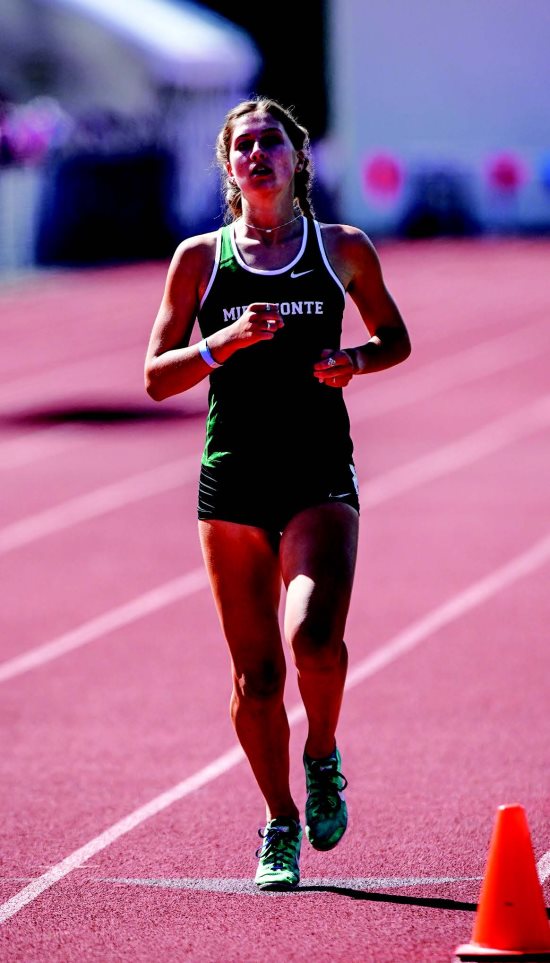
| ||||||
Haskell was drawn to running whether it was cross country, which she began in the second grade, or soccer, which also entailed a lot of running. "My love for running just grew and grew," said Haskell. "Around seventh grade I quit soccer and focused exclusively on running."
As a freshman, Haskell ran 4:52.29 in the 1600 meters and 10:51.37 in the 3200 meters, time that rated her the No. 2 freshman in the country and garnered her a lot of publicity which for one so young is not always easy: "It was not tough then because I did well that season but it got tougher when I got that exposure and then I was getting injured and I wasn't where I wanted to be. It may have been a little scary because I was new to high school running and I was running against people that were four years older than me."
The challenges seemed to come one after the other through her high school career starting with a stress fracture in her foot and an assortment of illnesses that constantly set her back, forcing her to miss most of her sophomore year and her junior year of cross country.
Tristan Tool, the head track coach at Miramonte, was a first-hand witness to what Haskell went through: "It's been a tougher road for Cassidy than most. Last year, we very slowly weaned her back on to running and enjoying it and being passionate about it and not feeling any pressure. It's been a long road back for her. She really fought back against everything to get where she is today and she has a really bright future because she has barely tapped into what she did as a freshman."
Haskell developed a new appreciation for what she got out of running when she was forced to sit out so much time: "It was pretty hard because I relied on running for more than just the sport. It helps my everyday life as well in many ways so not having that was tough. Overall, it gave me the motivation to come back even stronger because I wanted it that bad."
For Haskell and the other long-distance runners, it has to be more than just running for times. There is a camaraderie with her teammates and other runners: "We're all a little bit insane to be able to constantly push ourselves beyond what we think we can. When you tell a non-runner that you run about 50 miles a week, they will look at you like your crazy. I think that we all have that crazy mentality to push each other to be better."
It was Haskell's endurance that stood out most to Tool: "Cassidy has a great ability to maintain her pace and to push herself and maintain high speeds for long periods of time. That's something that you can't teach or coach. As people would fatigue and fall out, Cassidy would grind and maintain."
When Haskell returned to running competitively again, her perspective was to take it, appropriately enough, a step at a time: "When I started running the 1600 meters in my junior season, I was 50 seconds slower than what I ran when I finished that season. I did not have any goals and wasn't aiming for any times, but I was just putting it out on the track each time and seeing what it led to."
Tool was a very important factor in Haskell's comeback: "He was very, very supportive. He always wanted the best for me and so he would work with me individually if I had an injury or I wasn't feeling my best, he would know exactly what to do and offer support the way I needed it. He would create workouts that would be beneficial to me and would put the time into my training and see where I needed to improve."
Tool appreciated how Haskell took on the leadership role for the underclassmen: "We have a great group of freshman and sophomores and she sort of mother-ducked them. She would drive them around and sit with them in the weight room. They all loved her a lot."
It was the mental aspect of running that Haskell saw as the most important part in the maturing process: "It's the biggest thing in running. You develop a lot of mental strength. Being able to push past the barriers that you didn't think you could takes time and a lot of practice. We had a lot of new runners that lacked experience so there was a lot of teaching and showing them how to do things in the best way. I created a lot of bonds with the younger runners which I really enjoyed."
Miramonte made a large impression overall on Haskell: "I made a lot of friends through running and school. I also made a lot of connections with my teachers with whom I could talk to and get advice from that prepared me for a lot of many of life's situations. In particular, I took journalism and wrote for the school paper and my teacher was Mrs. (Donya) Goussiost. I had her for five different classes. She became a mentor to me and someone I could talk to and someone I know I can continue talking to through college and beyond. She is very important to me and I know for a number of other students as well."
Choosing to go to Cal was an easy decision for Haskell: "I will be running cross country and track. I wanted to run in the PAC 12 and I know a ton of people on their team so I will have connections going in. Geographically, it's close but on another level, it doesn't feel very close. I'll be gaining a lot of independence and look forward to joining the college and track community along with getting a great education there."
Reach the reporter at:
